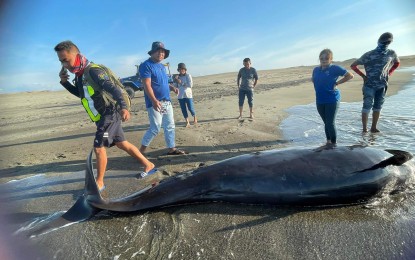
STRANDED. A 12-foot female pilot whale, which fishermen found beached along the shores of Barangay Masinloc in Paoay, Ilocos Norte Wednesday morning, was again stranded after it was released back to the sea on Thursday morning. It, however, died hours after it was transferred to a safer place, where authorities intended to give the mammal supportive care. (Photo courtesy of BFAR Ilocos Norte)
LAOAG CITY – A rescued pilot whale at the shores of Paoay, Ilocos Norte was found dead, hours after it was released back to the sea.
In a phone interview, Vanessa Abegail Dagdagan, senior aquaculturist of the Bureau of Fisheries and Aquatic Resources, said villagers found the injured 12-foot female mammal beached at the shores of Barangay Masinloc in Paoay, Ilocos Norte around 8:39 a.m. on Wednesday and immediately reported it to authorities.
She said the mammal was placed at a make-shift rehabilitation facility before it was released back to the sea Thursday morning.
However, it was stranded anew along the shores of Paoay, prompting local authorities to call for veterinary services.
Dagdagan said the pilot whale appeared to be weak, and was transferred “to a safer ground where she will be given supportive care until her swimming and normal buoyancy return.”
In a separate interview, Arthur Valente, Philippine Marine Mammal Stranding Network focal person for Ilocos Norte, said they suspected that the pilot whale had just given birth since they found what seemed to be milk in her mammary gland.
“We provided supportive care and tried to observe her swimming behavior but she did not make it. We performed a necropsy and found there is milk in her mammary gland," he said.
Valente said marine animals often get stranded when they flee fishermen hunting them, when they are sick, fleeing bad weather or dynamite fishing, or when they get lost in their search for food.
Record shows Ilocos Region has been among the identified hotspots of dolphin and whale strandings over the past 15 years.
Valente said cases of stranding in the region were unreported in the past because locals were unaware of the endangered species. (PNA)
